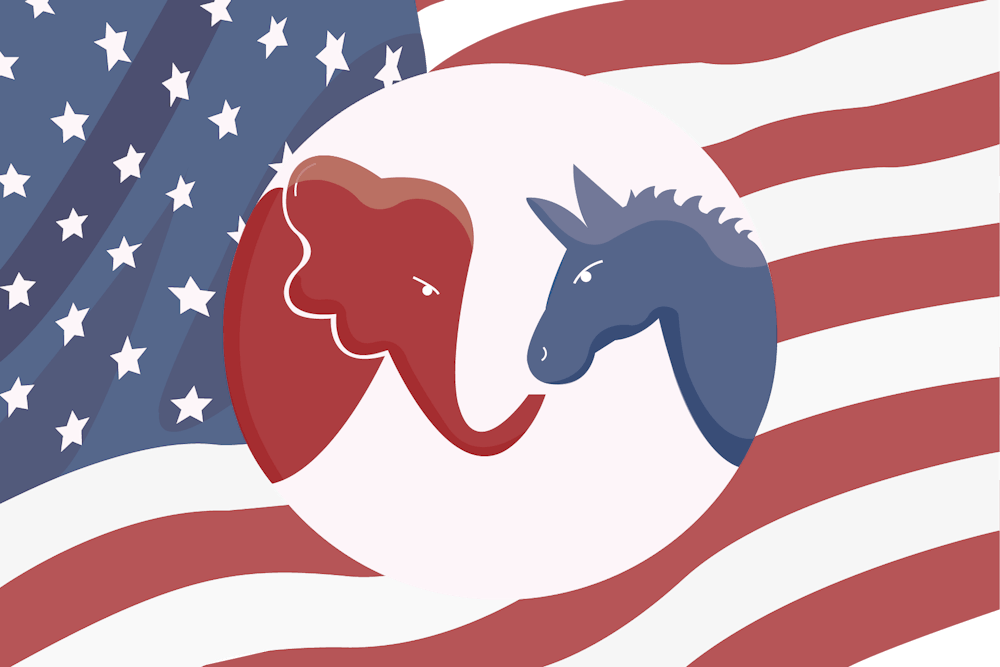If America wants to change its politics for the better, the two-party system must be broken. Almost all of the problems of American politics can be traced to the divide between our two parties.
For a country that prides itself as the greatest democracy on the planet, there are glaring problems with America’s system. The largest problem is how the two-party system forces together people that normally would not be on the same side. For example, the Republicans vary from socially liberal libertarians to evangelical-borderline-theocrats. Meanwhile, the Democrats vary from centralist moderates to social democrats.
This big-tent mentality causes internal division between the parties and is partly why the primary campaigns can be so contentious. America witnessed this during the Democratic primaries a few months ago, where centrist and moderate Democrats such as Joe Biden faced off against progressive Democrats such as Bernie Sanders.
According to noted socialist Democratic Rep. Alexandria Ocasio-Cortez, in any other country, these people wouldn’t be in the same party. But in America, where there are only two choices, the candidates have to sell that their version of what their party stands for is the correct one.
Additionally, most other democracies have more than two parties. Even other countries that have a big center-left and a big center-right party like the United Kingdom and New Zealand have other viable parties in their legislatures. The U.K., for example, has more than just its Conservative and Labour parties. There’s the Liberal Democrats, the Scottish Nationals, the Greens and several more. Having more parties also lowers the chance of two parties being deadlocked in endless stalemate like America sees itself in so often and that George Washington warned against in his farewell address.
However, the root of the issue is how American elections use a first-past-the-post voting system. The way the system works is that everyone gets one vote, and the candidate with a plurality wins. This system fundamentally discourages more than two parties because a plurality does not equal a majority. Because of this, a third party can draw votes away from another, causing a different party with less shared beliefs to win.
This is something with abundant historical precedent. From Theodore Roosevelt’s 1912 run causing Woodrow Wilson’s victory to Ralph Nader's run in 2000 resulting in George W. Bush's victory, the point stands that whenever a third party receives significant voter turnout, the party with opposite beliefs wins.
This system forces people to vote strategically instead of for the candidate who most shares their beliefs. And this is why campaigns have devolved into mudslinging since politicians just have to convince voters that the other person is worse than them.
So, how would America reform this? The biggest reform would be to throw out first-past-the-post voting with ranked-choice voting. Ranked-choice voting fixes most of the problems immediately. The simple change is that a voter would be able to rank the candidates in terms of preference. If no candidate receives a majority, the candidate with the least support is eliminated. That candidate’s support is then transferred to what voters had as their second choice. This process continues until one candidate receives a majority.
With this system, the argument that a third party vote would be throwing away your vote wouldn’t be valid. Additionally, candidates would be able to viably run as other parties, and since other parties would be viable, candidates would have to run to win support by their beliefs as opposed to insulting the other sides. On top of that, candidates would also be running to win people’s second, third, etc. choice, not just their first.
But the adoption of ranked-choice voting is just one step for America to reform its electoral system, which has many fundamental flaws. Other steps could be campaign finance reform, either the reform or abolition of the electoral college, and term limits for Congress.
All of this would be an uphill battle, but the point is clear. The system is broken, and America is dissatisfied with it. These changes must be enacted.

